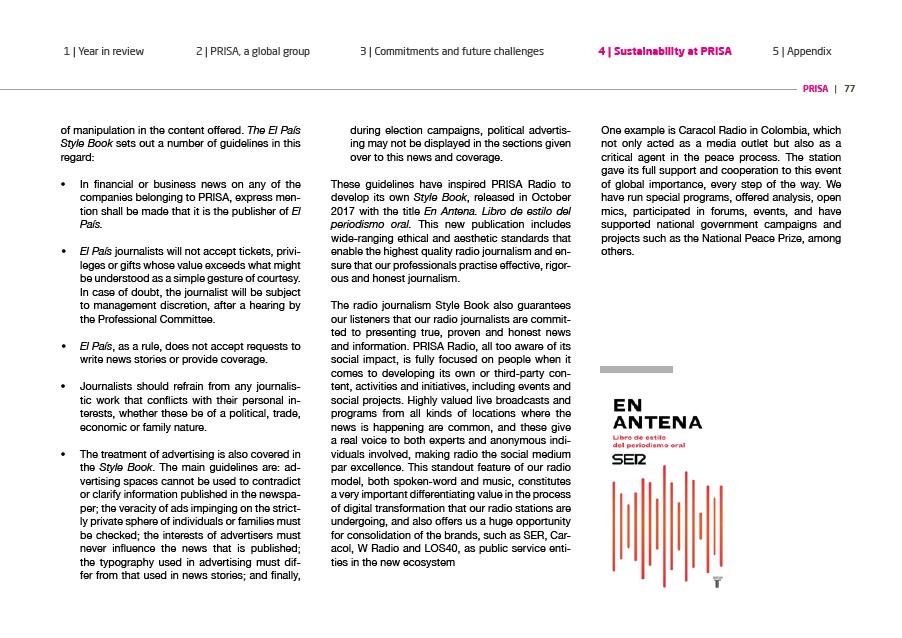
1 | Year in review 2 | PRISA, a global group 3 | Commitments and future challenges 4 | Sustainability at PRISA 5 | Appendix
PRISA | 77
of manipulation in the content offered. The El País
Style Book sets out a number of guidelines in this
regard:
• In financial or business news on any of the
companies belonging to PRISA, express mention
shall be made that it is the publisher of El
País.
• El País journalists will not accept tickets, privileges
or gifts whose value exceeds what might
be understood as a simple gesture of courtesy.
In case of doubt, the journalist will be subject
to management discretion, after a hearing by
the Professional Committee.
• El País, as a rule, does not accept requests to
write news stories or provide coverage.
• Journalists should refrain from any journalistic
work that conflicts with their personal interests,
whether these be of a political, trade,
economic or family nature.
• The treatment of advertising is also covered in
the Style Book. The main guidelines are: advertising
spaces cannot be used to contradict
or clarify information published in the newspaper;
the veracity of ads impinging on the strictly
private sphere of individuals or families must
be checked; the interests of advertisers must
never influence the news that is published;
the typography used in advertising must differ
from that used in news stories; and finally,
during election campaigns, political advertising
may not be displayed in the sections given
over to this news and coverage.
These guidelines have inspired PRISA Radio to
develop its own Style Book, released in October
2017 with the title En Antena. Libro de estilo del
periodismo oral. This new publication includes
wide-ranging ethical and aesthetic standards that
enable the highest quality radio journalism and ensure
that our professionals practise effective, rigorous
and honest journalism.
The radio journalism Style Book also guarantees
our listeners that our radio journalists are committed
to presenting true, proven and honest news
and information. PRISA Radio, all too aware of its
social impact, is fully focused on people when it
comes to developing its own or third-party content,
activities and initiatives, including events and
social projects. Highly valued live broadcasts and
programs from all kinds of locations where the
news is happening are common, and these give
a real voice to both experts and anonymous individuals
involved, making radio the social medium
par excellence. This standout feature of our radio
model, both spoken-word and music, constitutes
a very important differentiating value in the process
of digital transformation that our radio stations are
undergoing, and also offers us a huge opportunity
for consolidation of the brands, such as SER, Caracol,
W Radio and LOS40, as public service entities
in the new ecosystem
One example is Caracol Radio in Colombia, which
not only acted as a media outlet but also as a
critical agent in the peace process. The station
gave its full support and cooperation to this event
of global importance, every step of the way. We
have run special programs, offered analysis, open
mics, participated in forums, events, and have
supported national government campaigns and
projects such as the National Peace Prize, among
others.